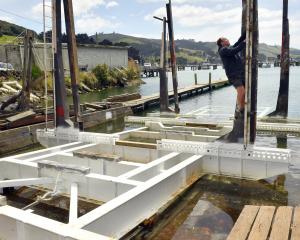
A drinking water servicing assessment and options analysis for Harington Point should shift from an indicated timeframe in a draft strategy of 1-10 years to 1-3 years, the hearing panel decided.
It recommended provision of reticulated water there move from an indicated timeframe of 10-30 years to 1-10 years.
The same pattern was recommended for wastewater services — bringing assessment work down to 1-3 years and provision to 1-10.
Indicative timeframes for infrastructure improvements were part of the draft future development strategy produced by the Dunedin City Council and Otago Regional Council and a hearing panel decided this week those which applied to the outer peninsula should be sped up.
Submissions had been made to this effect by Te Rūnanga o Ōtākou and Kāti Huirapa Rūnaka ki Puketeraki.
Ōtākou representative Edward Ellison said there was no town supply water, wastewater or stormwater infrastructure there.
He also pointed out part of the peninsula road-widening and safety project remained incomplete.
Recommendations from the hearing will not force the two councils to adjust their priorities, but they will need to bear in mind the signals sent.
Panel chairman Rob van Voorthuysen described the peninsula Three Waters recommendations as "giving an earlier signpost".
The panel had heard some historical decision-making, including by the Crown, had hindered the community.
Commissioner Andrew Noone said recognising Treaty of Waitangi commitments was part of the process.
Commissioner Jim O’Malley said "we need to put into effect our relationship with mana whenua, to be honest".
Rūnaka appointee to the hearing Hoani Langsbury recused himself from the peninsula deliberations.
Completion of the peninsula road safety and cycling project was shifted by the panel from a timeframe of 10-30 years in the draft strategy to 1-10 years.
Commissioner Kate Wilson pointed out the project was also about increasing climate resilience.
"We have a key tourism asset out on the Taiaroa Head . . . and at the moment that road is not resilient."
The panel also brought forward Three Waters indicative timelines on the area it called the North Coast.
This meant addressing capacity constraints on the water supply to Warrington, Waitati and Seacliff — as well as investigating options for an alternative source for the Waikouaiti and Karitane water supply — moved from 10-30 years to 1-10.
A drinking water servicing assessment and options analysis for Brinns Point was brought down from 1-10 years to 1-3.
Indicating provision of reticulated drinking water for Brinns Point was accelerated from 10-30 years to 1-10.
An overall assessment of North Coast wastewater facilities would have a timeframe of 1-3 years.
Indicative provision of reticulated wastewater servicing to Puketeraki, Brinns Point and Waitati moved from 10-30 years to 1-10.












